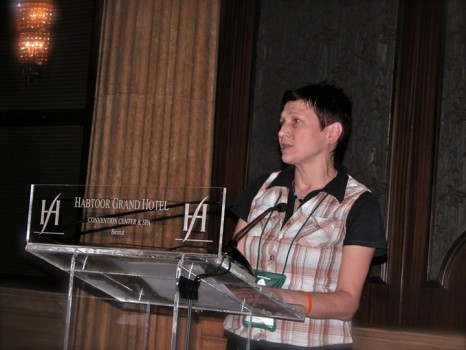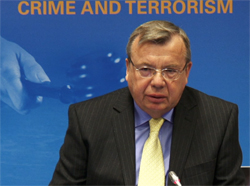 Speech by Irina Teplinskaya-Abdyusheva at the IHRA conference in Beirut April 2011.
Speech by Irina Teplinskaya-Abdyusheva at the IHRA conference in Beirut April 2011.
Good afternoon! My cordial greetings to everyone who came here today. I am very much honoured to speak at the final session of this Conference, and I am actually very nervous about it. Unlike most of you, I am very new to the activists community, I have become an activist just recently, and this is my first real experience at the International conference. And I not only feel highly privileged but also deeply responsible to speak up on behalf of all Russian drug users. For the first time ever, this marginalized community is now getting chance to have a personal representative speaking publicly about our problems and giving a first-hand evidence about widespread violations of our human rights. I do not speak good English, but I speak from my heart, and I believe that speaking heart to heart will help us understand each other even if we speak different languages.
My life is like a small mirror showing a bigger general picture; it gives an example of what’s happening to millions of people using drugs in Russia and most other countries of the former Soviet Union. I am 44, and for the past 30 years I have been suffering from a chronic opioid drug addiction. According to the definitions of the World Health Organisation and the United Nations Organisation, drug addiction is a chronic recurrent disease. However in my country, people suffering from drug addiction are outcast by default, they are socially isolated and deprived of their civic rights! I was born in the Soviet Union in a high-rank family. I could have had great prospects and a brightest future, I could have done something good for my country. But this future has never come. When I was 14, I had my first experience with opium, and since then I have been living in my country as an outlaw, persona non-grata. I had multiple unsuccessful attempts to treat drug addiction in different clinics, but they all failed, and every time I got back to drugs. I spent 16 years in prisons, sentenced to jail for purchasing and possessing drugs for personal use – which means, for behaviours directly caused by and symptomatic to my disease! My family abandoned me, I became homeless and for 2 years lived literally in the street. Whatever happened to me, I continued using drugs, I lost my battle with the disease. Through contaminated syringes, I have acquired hepatitis C and HIV. Last time I was in prison, in 2007, I developed AIDS and had tuberculosis. At this moment I, for the first time in my life, have undertaken efforts – though not quite deliberately – to protect my major right, the right to life. The HIV therapy in Russia is guaranteed by the government, but to get the vital and essential medicines for HIV treatment in prison, I had to go on hunger strikes and to open veins. As a result, I almost killed myself, my life was in danger, and before it was too late I was sent from prison to a tuberculosis hospital.
God knows why I did not die, I survived just despite everything – even though nobody actually cared for me: neither my family, nor friends, nor my country. I had no place to go. Two years I have lived in the tuberculosis hospital, working as an aid-woman in the HIV-TB coinfection department. In this two-year period, I witnessed deaths of more than 100 friends of mine and people who I knew – all young people, quite talented and promising. Almost all of them died for one common reason – they were opioid-addicted, and they came for treatment on last stages of the disease, when it was already too late to help them. Drug-addicted people have little opportunity to receive an adequate HIV and TB treatment, as they just cannot stop being addicted, and their addiction force them into never-ending hunts for illegal drugs and money for the drugs, involving criminal activities.
I could never understand one thing. All those officials who is responsible for the deaths of thousands of young people in Russia – either because of their lack of professional expertise, or their negligence, or narrow-minded stubbornness, or personal idleness – how can they live in piece and sleep easily? They leave people to die doing nothing to help them, while most of those who died could have lived and loved, and raised their children, or at least could have died with dignity. Those officials and public servants, I wish they saw how people dying without help. I wish they looked into the eyes of those living without a hope. These eyes, I will never forget; I could never forget how they look at you… and in these eyes you see horror, a cry for help, and a subtle reproof that unlike you, they’ve got no miraculous escape. Before they died, almost all of them had asked for heroin, and I was bringing it to them. I also made injections, because many of these dying people could do no more efforts, not even find a vein. I think that doctors understood what I was doing, but they never punished me for that, I think because they could do nothing themselves to relieve suffering. What I did was illegal, I could have been sentenced as a drug-dealer for doing that. If I were caught, the judge would not care that I did it to fulfil the last wish of people who were dying – that’s how their “humanistic” principles work, indeed!
To love them and to remember, to make sure that other people do not forget these deaths. There are different ways to do it, and everyone does what they can: someone is mourning, someone is praying, someone is bringing flowers to their tombs. Someone else chooses to act instead of talking. I think it is a right thing when our love, friendship feelings and memories are manifested in concrete deals, not only in nice words. This was my reason to become an activist: I realized that I cannot stay like that any longer, doing nothing; if the government does not care about us, we can protect our rights on our own. I took a number of training courses and started to work at one AIDS servicing organisation that provides services to people living with HIV and drug users. Being drug- addicted myself, I had difficult times trying to work, and at the same time struggling with withdrawal symptoms, trying to get drugs or money for new drugs. Many times I failed, lost everything and had to start all over again. My life felt like a deadlock labyrinth, often I did not want to live. Everything changed last year when I have met Anya Sarang, President of Andrei Rylkov Foundation – the only non-governmental organisation in Russia openly advocating for substitution treatment programs for opioid drug users. I became a member of the Working Group on Advocacy of Substitution Therapy in Russia, and finally I’ve got the opportunity to protect my human rights and rights of millions of other drug-addicted people in Russia, working in a team instead of trying to do it alone, on my own. Everyone has the non-discriminatory right to health!
Dozens of young people in Russia die every year because, according to the national law, it is prohibited to use the opioid substitution therapy with methadone and buprenorphine, which are recommended by the United Nations and have proved their efficiency in all developed countries of the world. Needle and syringe programs have recently been banned in Russia, too – although according to the General Assembly of the United Nations Organisation, these are a major component of comprehensive HIV prevention programs among people who inject drugs. Even scientific discussions of issues related to the use of methadone – one of the essential medicines recommended by the World Health Organisation – is considered illegal and can be classified as “propaganda of drug use” in Russia. Russia officially approves prohibitory approaches in drug addiction treatment, based on forced abstinence and involving humiliation and deprivation of rights of people using drugs. In a case that recently was widely discussed throughout the country, one regional organisation, the foundation City Free Of Drugs, offered drug addiction treatment services based on the use of such ‘methods’ as kidnapping drug addicted people, chaining them with handcuffs, starving, beating and torturing. A considerable part of the general public expressed support to the use of such approaches in drug addiction treatment. Even human rights organisations did not protest against the use of such approaches; some human rights activists have actually even supported them. Drug use-related stigma is so high in our country that even human rights professionals often do not consider us humans that have undeniable rights, just like the other citizens. Pregnant women are not given any specialised narcological assistance; they have either to terminate pregnancy or to continue using illegal drugs till they have their babies. In the countries where substitution therapy is available, drug-addicted women, like any other women, can have babies, nurse and raise them without risking their health or lives. In our country, there is no specialised crisis center for drug addicted women with children who wants treatment to stop using drugs.
In October 2010, I appealed to Mr. Anand Grover – UN Special Rapporteur on the Right of Everyone to the Highest Attainable Standard of Physical and Mental Health – with a complaint against Russia, asking for an international decision or other measures to make Russia provide proper treatment to drug users. Currently I am preparing similar appeals to the Constitutional Court of the Russian Federation and the European Court of Human Rights. My actions received a wide coverage in the national media – many papers wrote stories and interviewed me about my initiative. Almost all interviewers asked one same question: “You want Russia to pay compensation to you by decision of the European Court? You do not want to get treatment to stop using drugs, but you request that your country provides you drugs at the expense of public funds?”
No, I do not want Russia to pay me a compensation! Thousands of my friends have died of AIDS, tuberculosis or overdose. As to myself, I’ve lost everything in my life: health, family relations, home, hopeful future. I spent half of my life in prisons, I was humiliated and broken only because I am ill. How can one assess it in terms of money??? Does anyone really think I had it all on purpose, just to avoid treatment? Having a chronic disease, I am striving to enforce my right to health, which is guaranteed by the Constitution of the Russian Federation, as well as the rights of 5 million people who use drugs in Russia! I want to have access to sterile syringes, to prevent thousands of young people annually from getting infected with HIV and HVC through contaminated injections. I want my friends to have access to treatment of HIV, tuberculosis and hepatitis – the deceases few people dying of nowadays in the developed world. I want my female friends to have no need to sell sex for drugs, I want them to be protected against violence and be able to have healthy babies and raise their children. I do not want hundreds of thousands lives to be broken every year in prisons for minor drug-related offences. I want the health officials to give us treatment, not throwing us away from life! Russia’s refusal to use opioid substitution treatment programs is absolutely ungrounded and not evidence-based; more over, it results in the violation of human rights. In October 2010, UN Secretary-General Ban Ki-moon visited a methadone clinic in Cambodia, demonstrating to the world that methadone maintenance therapy programs are legal, important and should be available to people with drug-related problems. UN Secretary-General himself handed methadone to patients at Cambodia’s methadone clinic. In Russia, we are also humans with universal human rights, and we also have the right to live!
In February 2011, during an official visit to Russia of the UN High Commissioner for Human Rights, Navanethem Pillay, I participated in her meeting with Russian human rights organisations. I had a privilege to speak to Ms. Navanethem Pillay on behalf of 5 million people using drugs in Russia, asking to interfere in the situation to protect human rights of people with drug-related problems in Russia, particularly their right to health. I handed to the Commissioner a letter signed by 17 international organisations working in the field of HIV/AIDS and harm reduction, that also called for measures to improve the situation with violations of right to health of drug users in Russia. Following our meeting, the UN High Commissioner for Human Rights delivered two recommendations to the Government of Russia:
1) to remove legal restrictions and to launch pilot programs of substitution treatment in Russia;
2) to provide financial and political support to needle and syringe programs, to ensure comprehensive HIV prevention measures, as well as drug users involvement in and adherence to health services.
The feedback from the Government was given immediately. The next day, a number of federal papers published interviews of Minister of Health Tatiana Golikova, and Head of Rospotrebnazor (Federal Service on Customers’ Rights Protection and Human Well-Being Surveillance) Gennady Onischenko. In their interviews the state officials declared that according to their data, there is no evidence of OST programs efficiency; substitution treatment is not a proper treatment but just a replacement of one drug with some other; and pilot syringe programs, previously held in some regions of Russia, all failed to decrease HIV transmission among people injecting drugs and had no influence on HIV situation. I would say, Russian officials are used to lie and to break their promises, because they are perfectly sure they can get away with this. This is why I decided I would not be speechless, I am not going to wait till I die of AIDS or overdose. I am going to appeal to international organisations for help. The right to health is one of the fundamental, inalienable human rights, guaranteed by a number of international conventions as well as the Constitution of Russia and the national law. I am sick of being frightened, of going through withdrawals, of hunting for money to get illegal drugs, of failing to adhere to HIV treatment program… I had enough; I am ready to fight for my rights till the end, because I am a human and I am a citizen of my country!
I do realise that it might be still too early to hope that my complains and appeals influence the official position of the Russian government so much that they ensure the human rights of people using drugs. But I am glad that the number of my supporters among drug users is growing already in my country. It means that my example has inspired people and they see that they should not be afraid to protect their rights because any discrimination of the basis of illness is illegal. Following my example, two other Russian drug users made individual complaints to the UN Special Rapporteur Anand Grover, and to the European Court of Human Rights. I think this is a great achievement. In November 2010 I was elected to the Eurasian Harm Reduction Network (EHRN) Steering Committee from the sub-region of Russia, which gives me more opportunities to fight for human rights of people using drugs. Currently, with the support from the International Network of People Using Drugs, we are actively working to establish the Eurasian Network of People Using Drugs. I strongly believe that this is just a beginning, first stage in the development of activism among Russian drug users; that people will finally overcome their fears, unite and stand out to protect their rights – we have nothing to lose! And in this, of course, we need and very much count on your support.
It is a pity that the Conference is over, but I am very grateful to all of you for sharing your experience with me. I am happy to have many new friends – it makes me stronger, keeps me alive and helps to work. I am not alone now – you all are my big and supportive family, and I will live in hope of new meetings and fruitful cooperation in the future. And finally, I would like to express my gratitude to managers of the International Harm Reduction Association and the International Network of People Using Drugs for the financial support of my participation in this conference. 1


